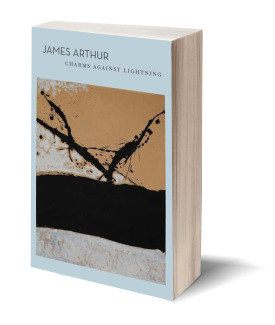Charms Against Lightning
By James Arthur
Copper Canyon Press |
 |
|---|
Reviewed by Lauren Hilger
In his debut collection, Charms Against Lightning, James Arthur presents the reader with chiseled poems that vary in tone from the upbeat to the irreverent to the melancholic.
In the title poem opening the book, Arthur repeats "against" in a litany that expands outward, picking up the flotsam of anxiety until "the deep sky welters and the windows quiver":
Against meningitis and poisoned milk,
flash floods and heartwreck, against daydreams
Against losing your fingers, drinking detergent,
earthquakes, baldness, divorce, against
falling in love with a child
The list, even with its increasingly grim subject matter, becomes a delight to read. Perhaps by taking notice, by considering potential catastrophe, it's as though some order is gained. Or perhaps, as the title suggests, the act of naming can keep those ills at bay.
It's an old-fashioned notion that one comes to poetry for communion, yet in Arthur's poems one is often confronted by a shared stake in grief. In "At Klipsan Beach," the speaker asks the reader to consider the following:
We are, and then we aren't;
that's the mortal art.I stood dying at the ocean's side
to dream up only this.
What could I do but make my shape?
I stake my shadow to this place.
There are virtually no words in this passage to alert the reader this was published in the year 2012; in fact, the passage above may include some of the most used nouns and adjectives in the English literary tradition. Nonetheless, the speaker carves out an empathetic plea to the reader and the poet's subtle meter is affecting.
Not all of Arthur's poems are so somber, nor so lacking a time-stamp. In fact, each poem varies greatly and taken together, they form a collection that revels in minimalism with a perceptive use of sound and image.
There's a sweet, shaggy masculinity to Arthur's speakers. "Poem from Behind a Gorilla Mask" begins, "Fuck you to the following:" and then continues:
(I can't keep track of names) anyone you know
with a waterfront view. All your accusers
and all whom they accuse. The many aching
to be the few.
In a similar spirit, the poem, "Omnivore" states:
I eat what's put in front of me,
as all great men do […]Someone put his wife in front of me; someone else,
his mediocrity.
In "Omnivore" and elsewhere, bravado, tension, and oddity coexist—a respite from the meditative poems. Arthur also makes antiquated subjects his own. In "Bucephalus, Charging," the famed horse of Alexander the Great is described as, "Riding over Persia / on titanium hooves, my gallop / tearing up the DMZ." In "Sprezzatura," he provides his own definition of the title term in the form of the 14-line poem of the same name:
Effortlessness, I learn again,
means putting all opinion & mulishness aside,so when this almost-nothingness
alights, as occasionally it must,
it lands with the padding footfall of a child ballerina
Effortlessness, sprezzatura, or the desire to achieve it, is one theme that unites the book's varied poems. In a sense, to land with grace, or at least with the slightly clumsy "padding footfall," is akin to keeping one's footing while stepping through that which is vastly strange.
Another theme that runs through Arthur's collection is marriage. Here, however, Arthur doesn't paint marriage with images of the everyday or the steadfast, but prefers to focus on marriage in flux, former wives, married women, and remarriage. The poem, "Independence," describes fireworks:
Ovals spawning Xeroxed ovals across a gassy sky
each boom pursuing its fiery halo. Happy marriage!
someone cries. I do, I don't,I might someday. Here's to the stars and bars!
To my bed, and you having nowhere else to go—bring a kiss, not your clothes . . . To the sky!
bright as a bottle shard . . . To optimism,and all the states, even the boring ones.
The poem continues in this voice, enthusiastic and celebratory, until it ends with the couplet, "take off his ring, keep it off / and put a ring on me." There is an immediacy in this poem that matches the holiday. Voices of friends shout over the fireworks and it ends on an imperative, as if the reader is being commanded to "take off his ring." Indeed, the imperative voice is a powerful tool in Arthur's hand; the second person can make the reader feel he or she is a close witness to a written event. Even when "you" is the beloved, that love is grammatically placed unto us, which happens in "At the Protestant Cemetery": "I found the famous poet's grave / while looking for you, found a snail / in its own ringed tomb crawling over a headstone." This stylistic voice fits with the collection, which explores human connection, both to others and to a sense of place.
In the quiet poems and the brassier ones, Arthur has a straightforward appeal. The poem "Epithalamium" (the title is a poetic form written for a wedding) contains an emotional register yet avoids sentimentality, even if that is, in a sense, the form's task. Arthur writes, "I will be very sorry / for all the things that I do / as long as we both shall live." Though the use of end rhymes can be a bit heavy (this poem, for instance, ends on the word "forgive") as a whole, the plain language of Arthur's book feels new with the boldness to just say it.
A poem entitled "Vertigo," ends with these two stanzas:
if stars
were gestures as if
by navigation as if
a messageother than the eye
finding itself
o i
miss you
Here, simplicity reads like a Cole Porter lyric; there's surprise in hearing language that isn't unusual, that remains outside of time. Few words move these powerful poems. But the collection as a whole grows beyond their brevity, with elegance and brashness.
